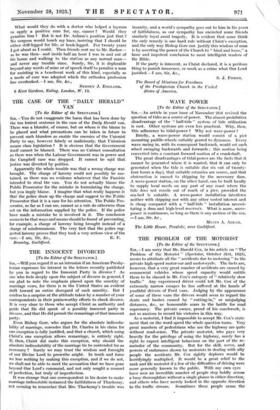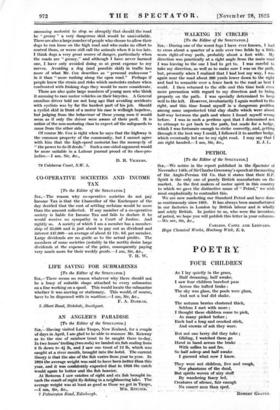THE PROBLEM OF THE MOTORIST
[To the Editor of the SPECTATOR.] Sta,—I am sorry that Mr. Harold Cox, in his article on " The Problem of the Motorist " (Spectator, October 81st, 1925), seems to attribute all the " accidents due to motoring " to the private high-speed motor-car and motor-cycle. The facts are, however, that a very great number of accidents are caused by commercial vehicles whose speed capacity would entitle them to be classed in Mr. Cox's category of " relatively slow traffic." Any experienced driver could tell Mr. Cox of the extremely narrow escapes he has suffered at the hands of youthful drivers of Ford vans. Judging by the appearance of some of these vans the drivers would seem to regard the dents and bashes caused by " cutting-in," or misjudging distances, &c., as honourable scars in the battle for road supremacy. The private owner, proud of his coachwork; is not so anxious to record his victories in this way.
As a motorist, I find it impossible to accept Mr. Cox's state- ment that on the word speed the whole question turns. Very great numbers of pedestrians who use the highway are quite without road-sense. The private motorist, who pays very heavily for the privilege of using the highway, surely has a right to expect intelligent behaviour on the part of the re' mainder of the community. But for the skill, nerve,- and powers of endurance shown by motorists in dealing with silly people the accidents Mr. Cox rightly deplores would be horrifyingly multiplied. It would be a great relief to the rank and file motorist if a few of the difficulties of driving were more generally known to the public. With my own eyes have seen an -incredible number of people step boldly across a busy thoroughfare without a single glance in either direction,- and others who have merely looked in the opposite direction to the traffic stream.• Sometimes these people cause the-. oncoming motorist to stop, so abruptly that should the 'road be " greasy " a very dangerous skid_ would be unairoidabIe. There are also a large number of people who- choose to allow their dogs to run loose on the high road and who make no effort to control them, or worse still call the animals when it is too late. I think dogs a very great source of danger, particularly when the roads are " greasy," and although I have never harmed one, I have only avoided -doing so at great - expense to my nerves. Avoiding a dog (and possible skid) in traffic has more of what Mr. Cox describes as " personal endeavour " in .it than " mere rushing along the open road." Perhaps if people knew the strain and risks which motorists endure when confronted with frisking dogs they would be more considerate.
There are also quite large numbers or young men who think it amusing to race motor vehicles on their bicycles. A General omnibus driver told me not long. ago that avoiding accidents with cyclists was by far the hardest part of his job. Should a cyclist skid in front of a motor his case is Wellnigh hopeless, but judging from the behaviour of these young men it would seem as if only the driver were aware of their peril. It is unfair, of the non-motoring class to expect all the safeguards to come from the other side.
Of course Mr. Cox is right when he says that the highway is the common property of the community, but I cannot agree with him that the high-speed motorist has the monopoly of " the power to-do ill deeds." Such a one-sided argument would be more suitable in a Labour journal proud of its class-pre. judice.—I am, Sir, &c.,
D. R. VICKERS.
79 Coleherne Court, S.W. 5.























































 Previous page
Previous page